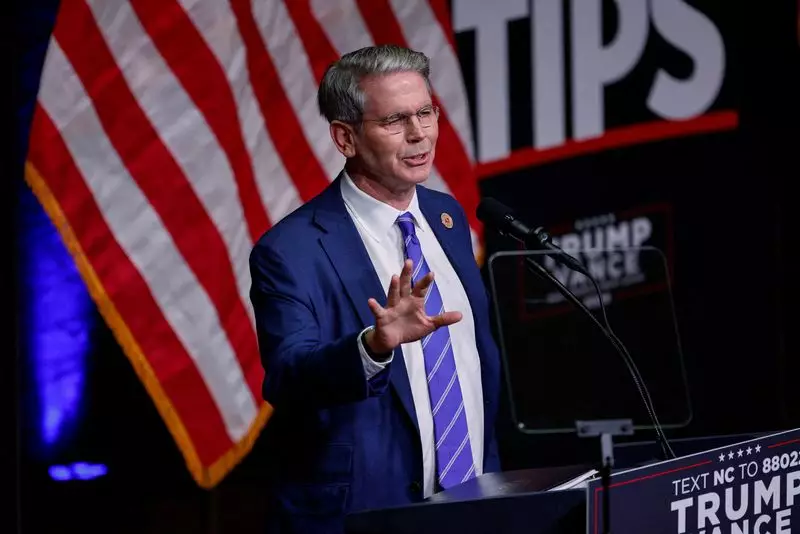Donald Trump’s appointment of Scott Bessent as the Secretary of the Treasury marks a pivotal moment in his administration, with profound ramifications for the future of U.S. economic policy. Amid swirling speculation and fierce competition for the position, Bessent emerged as a distinct choice, exemplifying a blend of finance expertise and a deregulatory stance that may please Wall Street and economic conservatives alike. This article examines the implications of Bessent’s nomination and the broader economic landscape that he will navigate as Treasury Secretary.
A High-Stakes Selection Process
The race for Treasury Secretary has historically attracted numerous frontrunners, but Bessent’s selection is particularly significant due to the complex interplay of interests at stake. Throughout the selection process, various candidates, including prominent Wall Street figures such as Apollo Global Management’s Marc Rowan and former Federal Reserve Governor Kevin Warsh, were considered. The competition supplied an atmosphere of uncertainty, reflecting Trump’s broader economic ambitions as he sought a nominee who could facilitate deregulation and tax reform.
Bessent’s extensive finance background, including his tenure at George Soros’s hedge fund and his own hedge fund, gave him a competitive edge. His ability to navigate the nuances of the financial markets and articulate the virtues of market-friendly policies likely aided his candidacy. Trump’s decision to consult closely with Bessent during his time at Mar-a-Lago indicated a strategic alignment on economic ideas that appealed to the president-elect’s priorities.
Wall Street’s Advocate
Bessent’s nomination comes at a time when Wall Street is eager for clarity on tax and regulatory reforms. His history of advocating for lower taxes and a reduction in regulatory burdens aligns with the hopes of many investors who are anxious about the potential for rising tariffs and disruptive economic policies. Analysts suggest that his understanding of market dynamics might mitigate the risks associated with an aggressive tariff regime that Trump proposed while campaigning.
An emerging consensus among economists aligns with Bessent’s strategy that advocates for economic growth through deregulation and financial stability. His previous writing in The Wall Street Journal emphasized the need for policies that encourage increased bank lending and energy production, signaling a preference that could resonate in the halls of the Treasury Department.
Facing Economic Challenges
Despite the initial optimism surrounding Bessent’s appointment, the new Treasury Secretary must contend with looming economic challenges. One pressing issue is the anticipated federal deficit, projected to expand significantly over the next decade due to proposed tax cuts and spending initiatives. With an already precarious fiscal landscape, Bessent will face immense pressure to manage federal spending responsibly while promoting growth-friendly policies.
Moreover, the inevitable rise in U.S. debt stands as a considerable concern. Analysts have pointed out that the push for expansion of tax reductions without corresponding increases in revenue could create an unsustainable economic trajectory. Bessent will need to balance these demands while reassuring both domestic and international markets about the United States’ fiscal integrity.
Bessent’s role extends beyond domestic economic management; he will also play a vital role on the global stage, overseeing U.S. financial sanctions and liaising with organizations like the International Monetary Fund and the World Bank. The treasury secretary has a say in how the U.S. approaches its economic support to other nations, which could cause friction given Trump’s inclination to prioritize national interests.
The evolving conflict in Ukraine presents a particularly sensitive diplomatic challenge. Bessent will need to address Trump’s desire to reduce U.S. financial involvement while managing international repercussions and fostering relationships with U.S. allies. His approach to sanctions and foreign investment will significantly shape U.S. foreign policy moving forward.
Another aspect of Bessent’s tenure will be his relationship with the Federal Reserve. He has indicated interest in innovative strategies, such as the possibility of establishing a “shadow” Fed chair, aimed at redefining the interaction between the Treasury and the central bank. This could signify a more assertive Treasury influence over monetary policy, altering the traditional collaboration dynamics that have characterized past administrations.
While these ideas may provoke interest among free-market proponents, they also raise concerns about potential shifts in the economic control balance. Maintaining market stability while advancing Trump’s agenda necessitates a careful approach, emphasizing transparency and consistent communication between the Treasury and the Fed.
Scott Bessent’s nomination as Treasury Secretary symbolizes a significant turning point in Trump’s economic strategy, reflecting a potential shift towards policies favoring deregulation and tax reform. Although he brings experience and a favorable perspective from Wall Street, Bessent’s responsibility will be to navigate complex economic challenges while addressing both domestic and global ramifications of his policies. The coming months will reveal whether Bessent can effectively bridge Trump’s ambitious agenda with the realities of a multifaceted economy.

